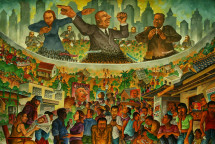Reconsidering the logistics of autonomy: Ecological autonomy, self-defense and the polícia comunitaria in Álvaro Obregón, Mexico
Topics
Regions
Inspired by experiences in Álvaro Obregón, or Gui’Xhi’ Ro in Zapotec, this paper discusses ideas of popular ecological struggle and self-defense.

Authors
Gui’Xhi’ Ro, a largely Zapotec town, was confronted in 2011 with a wind energy megaproject on the Santa Teresa sand bar (Barra). This project triggered an exaggeration of local political corruption, unequal benefit sharing, new regulations and threatened local livelihoods. Consequently this wind project sparked an insurrection, not only against the wind company, but all political parties, transforming into a struggle for indigenous autonomy that established town-wide governance based on Indigenous customary law — usos y costumbres — and forming a polícia comunitaria.
Acknowledging industrialism as ‘ the structure of oppression,’ this paper begins by relating industrial organization to authoritarian populism and its ‘green’ articulations through environmental and climate change discourse. This critical lens towards industrialism, as it relates to colonial-statist forms of organisation, leads to reviewing anarchist ideas of informal organising, ecological autonomy and self-defense, before outlining the struggle in Álvaro Obregón. Following this outline, the next section reflects on the experiences and limitations faced in Gui’Xhi’Ro. The article concludes by discussing the value of reviving strategies of popular ecological struggle(s), which resonate historically and practically with autonomous indigenous struggle.
This paper was presented at the Emancipatory Rural Politics Initiative (ERPI) 2018 Conference: "Authoritarian Populism and the Rural World"